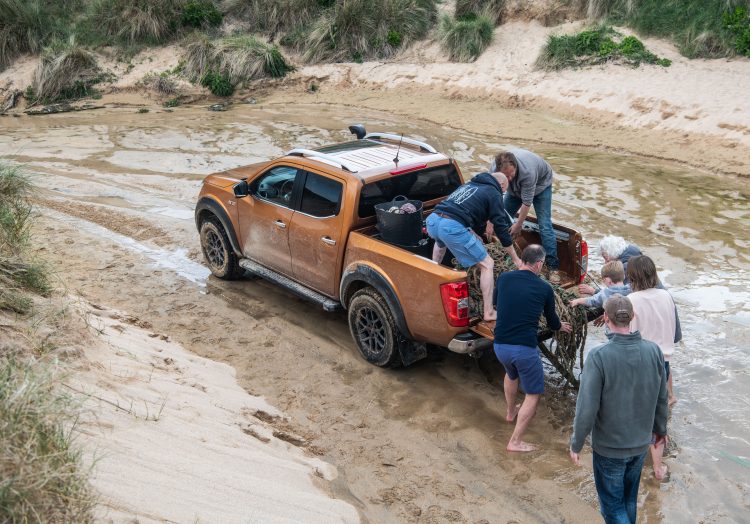These beach cleaners are battling the rise in rubbish on Britain’s coastline
A team of beach cleaners battling the rise in rubbish on Britain’s coastline has used a rugged off-roader to clear up polluted beauty spots.
Marine biology student Emily Stevenson, 21, and her father Rob, 50, have been cleaning beaches in Cornwall for ten years.
Their community group, Beach Guardian, is made up of an army of dedicated volunteers but its task is getting tougher as the problem gets progressively worse.
And after struggling to reach remote locations and remove bulky rubbish from Cornish beaches with their family car, they posted a request for help on social media.
Nissan stepped forward and loaned them a brand-new Navara off-roader AT32 pick-up truck – complete with snorkel – to help with the hardest of tasks.
On Constantine Bay, where Poldark is filmed, the Navara pulled out rope and plastic nets which had been buried deep into the sand for more than two years.
Remote rocky beaches were easily negotiated and the off-roader’s snorkel allowed it to wade through deep water without the engine cutting out.
Nissan has highlighted the hard work of Beach Guardian to mark Friday’s World Oceans Day 2018 and celebrate UK community heroes tackling beach plastic pollution.
During its recent Great British Beach Clean Up, the Marine Conservation Society found 718 pieces of litter for every 100 metre stretch of UK beach surveyed.
Rob Stevenson said: “The beaches people visit, where they enjoy ice-creams and watch
their kids build sandcastles, are just one view of the issue.
[youtube https://www.youtube.com/watch?v=38T0_7B-5Fw?enablejsapi=1&autoplay=0&cc_load_policy=0&iv_load_policy=1&loop=0&modestbranding=0&rel=1&showinfo=1&theme=dark&color=red&autohide=2&controls=2&playsinline=0&]
“There are many more remote and unseen parts of the coastline that volunteers either struggle to reach, or need something to move larger items.
“Normally we’re using just our own family cars or DIY tools. Without help from Nissan and
the Navara Off-Roader AT32, we could never have released the old nets buried in the
sand dunes for years.”
More than eight million tonnes of plastic end up in the world’s oceans every year with devastating consequences for marine wildlife, fisheries and tourism.
Nissan is now inviting community groups across Europe to nominate remote and tough-to-reach beaches or other locations where the Navara could help them clear plastic waste.
And it is also encouraging its European employees to use its own volunteering program, Days for Change, to join local beach cleaning projects where appropriate.
In the UK, members of the public or community groups who want to highlight an area of beach that needs clearing of plastic waste should use the free ‘What3Words’ photo app to send an image of the beach plastic they’ve found along with its precise location to Nissan GB at beachclean@nissan.co.uk
What3Words is unique global addressing platform that allocates every 3m x 3m location
with a simple three word address, e.g. ocean.plastic.waste.
This address corresponds to a GPS location, which allows a specific spot on a beach to be identified and easily shared – even along the most rugged and remote coastlines.
Ken Ramirez, senior vice president, sales and marketing, Nissan Europe, said: “The Navara Off-Roader AT32 is the perfect partner for Beach Guardian.
“Designed to take on the most challenging conditions like wet sand and rocks, and with a snorkel that allows it to better drive through water, it’s ideal to support their work on remote beaches.
“Community heroes like Emily and Rob, who give their own time to try to make a
difference, are an inspiration to us all.”

